Creating an enviable life for all kids: A Q&A with Nancy Anderson, retiring early intervention and special education leader
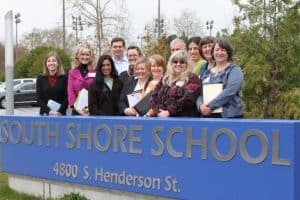
Nancy Anderson and Early Works partners visit South Shore School in Washington state.
Nancy Anderson, who leads Early Intervention and Early Childhood Special Education services in Multnomah, Hood River, and Wasco counties, is retiring after 40 years helping children achieve success. Although Anderson holds titles with both the Multnomah Early Childhood Program and the David Douglas School District, her work has spanned much more than these titles alone suggest. She is admired statewide for her leadership around professional development, has been an integral thought partner for educators and administrators, and has played a key role in the creation and success of the Early Works initiative at Earl Boyles Elementary. There she helped create a preschool that was funded by multiple agencies, including MECP.
The Children’s Institute is grateful to Nancy Anderson for her years of public service, dedicated to improving all children’s lives. “Nancy was fundamental in launching the Earl Boyles preschool program and in advocating for full inclusion of children with special needs in a universal preschool setting” says Swati Adarkar, President and CEO of Children’s Institute. “Nancy has been a key partner, not just for the Children’s Institute and Early Works, but across the state. She has pushed everyone to innovate, and has fought hard to improve the odds for all Oregon kids.”
“Nancy has been a leader in EI/ECSE since the very early beginnings of this statewide program,” says Anderson’s colleague Judy Newman, the Co-Director of Early Childhood CARES and a member of the governance consortium for Lane County’s early learning hub, the Lane Early Alliance. “She is a critical thinker and innovator, always striving to stay improve services and supports based on the current evidence in the field. She asks important questions and challenges us all to constantly evaluate what we are doing and to grow and change as needed.”
We talked with Anderson about her career, the current state of early intervention in Oregon, and what policymakers can do to ensure all kids have an equal shot at success.
CI: Why is the interplay between early intervention and early childhood education so important? For example, why should preschool teachers in public settings be dually accredited in special education and preschool?
NA: When I think about early childhood or our K-12 systems, kids come to us from wherever they are – there is a lot of diversity. If you have a group of 20 kids, 17% of them have a delay or disability, and/or are dual language learners and/or have experienced trauma. So what do staff need to do be able to deal with that? Teachers need to know enough in each area to be able to [address the diversity of issues]. That is where the importance of dual accreditation comes from – if the teacher has no background in knowing what to do with students with special needs, having a special education specialist come in once a week isn’t going to make a big difference. For kids with disabilities, inclusion early in school sets the stage for inclusion later and leads to greater success for graduation rates and career success.
CI: What has been your role in Early Works and the preschool at Earl Boyles?
NA: Years ago we first sat down with Swati Adarkar and a group of partners from around the county, asking what do we need and where should we do it? We decided to move forward with a preschool in the David Douglas School District. The Community Needs Assessment for the area showed that, out of all the things, the community really needed access to preschool. So we thought: If we built a preschool model what would it look like? We wanted the preschool to service all the kids in the catchment area, so we could impact the trajectory of kids prenatal to age 3 [P-3], and into the K-12 system. We worked to include kids in Head Start and Early Childhood Special Education. All of the detail work to get the preschool started was really complicated, hard work. You really have to have people who want to figure it out and who are willing to do hard work. But does it need to be done? Yes.
CI: Tell us about your statewide leadership around professional development.
NA: Last year, [Former] David Douglas Superintendent Don Grotting and I went to the Oregon Department of Education to offer a summer institute for professional development that would be open to anyone in the state. We created the institute in partnership with the Early Learning Division, Oregon Department of Education- Early Intervention/Early Childhood Special Education and the David Douglas School District. It was phenomenal. It was so popular that the department wanted to do it again this year, and extend it to an entire week. This year’s institute is offering seven courses on topics like coaching, dual language learners, and positive social emotional development. Educators from all sorts settings attend – child care, K-3rd general education, community preschool, Early Intervention/Early Childhood Special Education, and Head Start.
We learned people are really hungry for P-3 professional development and learning – and for something that isn’t just a day long.
CI: What are you most proud of having accomplished in your career?
NA: There isn’t any one project or initiative. It is probably more that I’ve always tried to ensure that kids and families have a shot at a full life – both at school and in their community. My focus has always been on making sure kids and families have what they need to be successful and have an enviable life. And think I’ve been pretty successful in making that happen!
CI: What drives you to push innovation at both the state and district levels? How have you gotten partners, teachers, parents, others, to buy in to early childhood investments?
NA: One of the things that makes a difference is to share some different experiences with them – show them what is positive and possible. People come to their work with certain experiences or lenses – and sometimes just don’t know what is possible! One of my biggest jobs as a leader is to really make sure I am bringing forward those stories and experiences of the partners and families we are working with to support their hopes and dreams.
For example, when talking to a parent of a young child with Down syndrome, they may have a dream of their child attending college. However, people in their life may be telling them it’s not possible. I might say ‘Oh! I hear you thinking about your child attending college in the future. Do you know that Northwest Down Syndrome Association is working with local colleges on a program called “Think College” which ensures students have access to college? It is possible!’ You have to kind of change the conversation.
And that is what Early Works has been about – showing people that it is really possible. At Earl Boyles, parent engagement has changed and they are getting great outcomes. It is important to share these stories and also share the data that shows things work. Once you put vision and outcomes together it is hard to say no.
CI: What is the number one thing parents and teachers could do to help more students succeed?
NA: For staff, kids, and families, the recognition that “this isn’t it.” There is always more to do. Things can be better. And when we bring people on board who understand that, we can always do even more.
CI: What is the top thing policymakers could do to help more students succeed?
NA: To ensure that whatever policies are being made to ensure kids have that best start – that it includes all kids. That when we say “all” and “every” that we really do mean “all.”

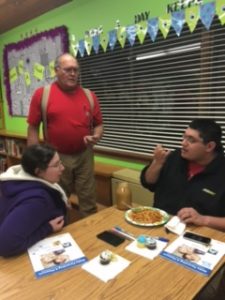
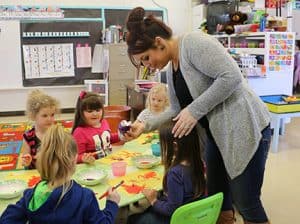 “I love the kids. I love watching them learn; I love teaching them,” Reigard says.
“I love the kids. I love watching them learn; I love teaching them,” Reigard says. At a recent conference at Umpqua Community College in Roseburg, she learned some new strategies to help her students understand the reasons behind their feelings. “I’ve struggled with some students in class that don’t know how to handle their feelings and so I’ve really been able to take them aside and talk about their feelings and really just work on supporting them emotionally,” she says.
At a recent conference at Umpqua Community College in Roseburg, she learned some new strategies to help her students understand the reasons behind their feelings. “I’ve struggled with some students in class that don’t know how to handle their feelings and so I’ve really been able to take them aside and talk about their feelings and really just work on supporting them emotionally,” she says.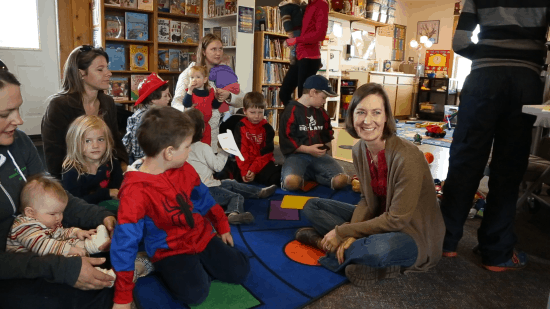
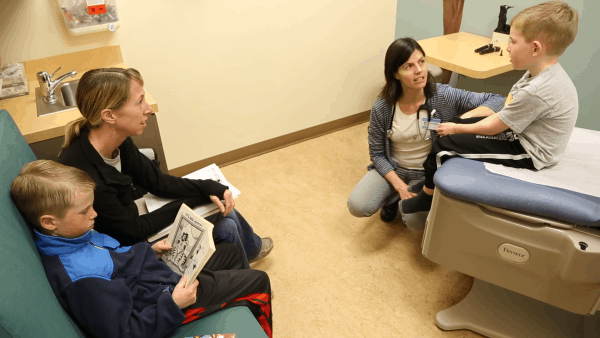
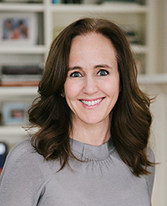 Dr. Suskind is professor of surgery and pediatrics at the University of Chicago Medicine and co-author of Thirty Million Words: Building a Child’s Brain. For nearly ten years, she has been committed to closing the opportunity gap by creating language programs for children from disadvantaged backgrounds.
Dr. Suskind is professor of surgery and pediatrics at the University of Chicago Medicine and co-author of Thirty Million Words: Building a Child’s Brain. For nearly ten years, she has been committed to closing the opportunity gap by creating language programs for children from disadvantaged backgrounds.